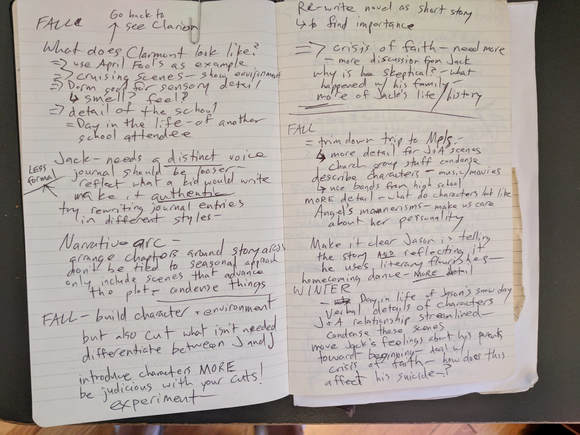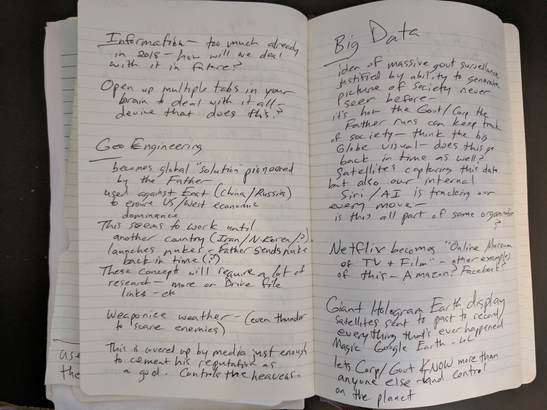|
Hello and welcome to the first part of a new, ongoing series! It is my earnest attempt to document my own process of composing a new novel in the hopes that it may inspire others to do the same. While I think this series will be interesting to all readers, be aware that it is going to get pretty in depth in the writing process. (I also hope to gain further insight into my process and how I come up with this stuff.) The idea. First of all, you need to have the idea for the book. This can literally be anything. Look around your life. What do you see? Injustice? Hilarity? Torment? Wonder? Characters? Setting? These can all be a starting point. Obviously I can’t tell you how to come up with your own ideas, but I can offer a few guidelines that have worked for me. The most important point: don’t stress about it, the ideas will come. I wish I could offer a simple timeline of when my ideas hit me, but the truth is I never knew when I would have enough to create a book. True, the first two novels (as I’ve stated elsewhere) I carried with me for years before I committed them to paper. And that’s not a bad way to start - if you have something you think should turn into a proper book, then you are ready for the next step. But for those of you who aren’t there yet, don’t fret; it will come. The next point: what do you bring to the table? How do you see the world differently from others? What kind of “hot take” (to use an awful current expression in the journo world) do you have on an important issue that you could translate into a fictional universe? I can only illustrate this with my own work, so here goes. My fourth novel is going to be a dystopian tale set around the year 2050, and features a major struggle concerning humanity and its existence in the age of climate disruption and geoengineering. Obviously I didn’t come up with all of that at the same time (but that would have been awesome). I was very much influenced in a few essays I read over the past four years - this one in The Point about genetic manipulation, this one in the NYRB about geoengineering, and this one (big time) in the LARB about the writer Amitav Ghosh and his request for stories about the largest issue of our time. But of course the list of influences is never ending - the 2013 Spike Jonze film Her radically altered my perspective of where Artificial Intelligence was heading, and the 2015 film Ex Machina made me terrified of a similar notion. Books such as Gibson’s Neuromancer showed me how to craft a compelling, futuristic narrative. That’s the great thing about prompts like these - each writer can take away their own message. The major lesson to draw from all of this is to overload your circuits with what you follow the most, and eventually, if there is a story there, you’ll find it. I had to percolate this novel idea for years, in random locations, pondering over what it was going to be. Then I created a Google Doc where I kept all my notes and considerations, links to those pieces so I could re-read them, and even some beginning drafts. You can do the same in a simple notebook. The important part is getting it down. The outline. Once you have the idea, and its solid, you can move on to the outline. Here is where my advice is going to be a little more tailored, and it may not fit your book at all. Essentially an outline is the plot, characters, and themes all put together in some kind of coherent fashion that you understand enough to refer back to when you need it. Again, all I can do here is explain my own process in the hope that it is helpful. For Our Senior Year, I literally broke the entire story down into its seasonal parts, in different ways. I’m attaching a picture of my notebook from that time to give an idea - Last Man on Campus was a pretty similar operation, in which I had the basic idea of the story broken down into the two semesters, and then had to work backward as I was writing to fill in some of the mythology of the society running the show (*spoiler*). Both of the outlines were basic - start with a major plot point, how it shows your characters, and their reactions. Et cetera. I won’t even delve into the insane process I followed for my current manuscript (Observe and Detach) as the story has evolved quite a bit in two years and I’m not too keen on showing where some of it comes from just yet. And unfortunately novel #4 is not following these outline steps at all, which I must stress is perfectly all right. In lieu of creating much of an outline as of yet, I sat down and cranked out what I think are going to be the major themes of the book - After almost four years of thinking about this, I have just enough story and character to begin the first drafts, and to be honest I have no idea where they are going to take me. There will be a lot more grist on this topic (Drafts) in the next post, so all I will say here is to not worry about how dense (or not) your outline of the novel is - if it contains the major characters/plot/themes that you want to get on the page, you’re getting there. Thankfully the wonderful technology of the notebook allows for you to always add more stuff - mine is crammed with papers and clippings but I still go back to it when I’m preparing a book. These are the techniques that have worked for me in getting a book through its initial stages. Short stories or essays (or really anything that’s not a novel) are different beasts, and if/when I ever get better at those forms I’ll try my hand at explaining how to come up with them. Next up will be the initial (as Anne Lamott would say “shitty first”) draft. I hope to get a post about that process up by the end of this month, again following my own process and how I’ve done it in the past. I also plan on sending my current manuscript of Observe to my editor by then, and may write a little something about that as well. Feel free to send any and all questions and comments my way, through email or in the comments. I want to hear about your own projects, if my advice is helpful, and how you come up with your own ideas and outlines I will also have an essay on the first book of the 2018 Reading List (The Handmaid’s Tale) up by the end of the month. Thanks for reading!
0 Comments
Leave a Reply. |
AuthorJohn Abraham is a published author and freelance journalist who lives in the Twin Cities with his wife Mary and their cat. He is writing a speculative dystopian novel and is seeking representation and a publisher. Archives
July 2024
Categories
All
|


 RSS Feed
RSS Feed